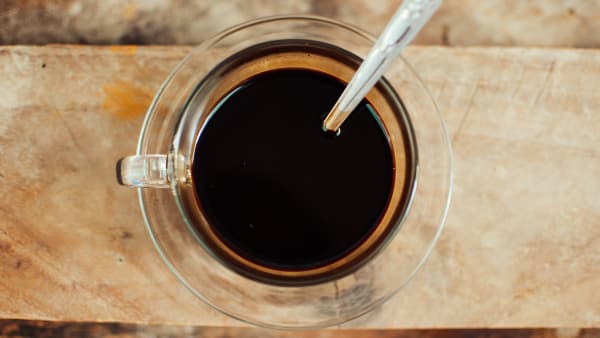Why Is Black Coffee Healthy?
No, it’s not just wishful thinking or something coffee drinkers throw back at pompous tea lovers (just kidding!).
Drinking coffee, especially black coffee, has been linked to numerous health benefits. A regular cup of joe can stave off and diminish multiple health problems and even boost mental and physical function.
Here’s why you might want to drink java — especially black coffee — every day. And not just because it’s delicious.

8 Health Benefits of Black Coffee According To Science
There are numerous health benefits of drinking a delicious mug of black coffee. And yes, they’re backed by scientific studies, not just wishful thinking on our part!
Here are just some of the benefits you may receive from a black coffee habit.
1. It’s Low In Calories
You hear about your daily coffee habit being so bad for your calorie intake, but the culprit isn’t really the coffee itself.
It’s all the sugar, syrups, sweeteners, milks, creams, malt, whip — all those add-ins that rack up the calorie count. The milkier and sweeter your brew (think latte vs. drip with a splash of cream), the more caloric your cup.
Black coffee, on the other hand, is low-calorie. Depending on the brew method and precise amount of coffee you use, a cup of coffee or two shots of espresso will have just 2-5 calories.
For comparison, the average brewed or drip coffee with 1 tbsp of half-and-half and 1 tbsp of sugar has 38 calories. A small nonfat latte has around 72 calories, and a mocha has about 129.
2. It Can Boost Your energy
Coffee is a great energy booster, especially when caffeinated.
Coffee has been found to give you more energy, improving physical performance and alertness. Interestingly, according to science even decaf coffee can boost alertness and reactivity, although to a lesser extent.
While any coffee, and especially caffeinated coffee, can boost your energy levels, some of the energy you’d get from, say, a really sugary blended coffee drink might come with a sugar crash.
And if you drink a large latte, you’re weighing yourself down with a lot of extra milk or calories. That won’t necessarily keep you from enjoying the added energy, but if it’s too filling, you might be counteracting that little boost.
Black coffee doesn’t have the added calories or sugar to slow you down.

3. It May Help You Lose Weight
Drinking black coffee may help your weight loss efforts.
Coffee significantly increases your metabolic rate, which in turn can help with promoting weight loss.
As this Healthline article explains, boosting your metabolism can be effective with weight loss. When your basal metabolic rate is up, you need to consume more calories. If you (safely!) watch the calories you eat so that your body is burning up more than you eat, you can lose weight.
For another thing, if you drink coffee regularly with extra sugar and milk in it, that’s plenty of extra calories and fat. Depending on how you “budget” your calories, switching to black coffee might be an easy way to cut unnecessary sugar and calories from your diet. And it still tastes good!
People who drink coffee regularly (1-2 cups per day) have also been found to keep up with minimum physical activity levels for health, which can also help you manage weight.
Other studies have found an association between higher coffee consumption and decreased body fat in men and in women.
So while drinking black coffee isn’t going to be your miracle weight loss cure, it might be a delicious way to augment your efforts.
4. It May Boost Your Mood
No, we don’t mean black coffee will boost your mood because you like it. Although it probably doesn’t hurt.
Remember dopamine, the “happy” hormone, and neurotransmitter? Coffee increases the availability of some key dopamine receptors, which can delay the reabsorption of dopamine in your body.
A black coffee habit can also be a good way to lower your risk of depression. A multi-study review found depression risk lowered with each additional cup of coffee drunk per day.
And higher coffee consumption — at least four cups per day — has been associated with even lower risk of depression. Coffee drinkers are also at a lower risk of death by suicide according to data.

5. It Will Make You Feel Energized
Caffeine doesn’t just boost energy, it can improve your physical performance. Which in turn might make you feel more energized.
As a Harvard health explains, exercise increases the body’s production of mitochondria (the powerhouse of the cell!), which in turn increases your overall energy supply. Exercise also helps circulation, which in turn helps you move better and use that energy more efficiently.
Meanwhile, coffee helps you be more energized and (potentially) more motivated to get a workout in. If you do manage to get a post-coffee workout in, a review of 21 studies shows a positive association between caffeine and endurance, muscle strength, and speed.
This is especially true of cardio (aerobic) workouts.
So basically, caffeinated black coffee might as well be the cheapest performance-boosting energy drink out there. Since black coffee is free of added sugars, that might make it the healthiest one, too.
6. It May Decrease Your Risk of Diabetes
Diabetes is no joke. You can’t prevent type 1 diabetes, but you can prevent or delay type 2.
Caffeine can positively impact insulin sensitivity, glucose metabolism, and lower inflammation, all of which are beneficial in delaying or preventing type 2 diabetes.
A 2018 study found that a lowered risk of pre-diabetes and type 2 were associated with coffee drinking in the long-term.

7. It May Lower Your Risk of Neurological Disorders
Possibly one of coffee’s greatest health benefits is its positive impact on brain function.
Coffee has been shown to lower your risk of dementia (including post-stroke dementia) as well as general cognitive decline. It’s also associated with lower risks of developing Alzheimer’s disease and slowing the progression of Parkinson’s disease
It might be a good idea to make a cup of black coffee and the New York Times crossword puzzle your new morning brain booster. To keep you sharp today and tomorrow.
8. It May Improve Your Liver Health
Want a healthy liver? Data suggests you should drink more black coffee. In moderation of course.
Okay, so drinking coffee is obviously no magic cure if you’re dealing with liver problems. But it’s worth noting that regular consumption of everyone’s favorite morning pick-me-up has been associated with better liver health.
Coffee consumption has been associated with lowered liver stiffness, which indicates less scarring in the digestive and metabolizing powerhouse organ, as well as lower rates of liver cancer in people already dealing with liver disease.
And, regular coffee drinkers rejoice. One study even suggests that your risk of dying from liver disease decreases as you drink more coffee. As if you needed another reason.
Downsides to Drinking Black Coffee
- It’s slightly more acidic. Although you can always buy coffee that’s lower in acid and brew it using methods that reduce acidity (like espresso), adding milk or milk alternatives is a great way to cut down on the natural acidity in the drink.
As long as you don’t personally have problems with the milk you choose (e.g. lactose intolerance), milky coffee tends to be easier on the stomach. - It’s harsher on an empty stomach. Speaking of stomach-friendly, black coffee is a bit rough on an empty tummy first thing in the morning. And if you’re not going to eat breakfast, your stomach might thank you for adding a little substance (i.e. milk) to your brew.
- It might be too hot. This one’s a bit obvious, but if you can’t wait a few minutes, your black coffee might be too hot to drink longer. Even if it doesn’t seem too hot, studies show drinking hot liquids can increase your risk of esophageal cancer (remember that 2016 study that had hot beverage drinkers horrified?).
- It can make you jittery. Too much caffeine, from black coffee or lattes, can make you jittery or anxious. Most people can counteract that by simply limiting their intake or switching to decaf, which still boasts a fair number of health benefits.
- It can increase blood pressure. Coffee drinkers do have to watch out for a high blood pressure after their morning cuppa. A higher blood pressure (+8/+6) can be measured up to three hours after consumption, regardless of whether you already have high blood pressure. However, it’s temporary, and this effect has not been associated with a regular coffee habit.
Related Read: Coffee VS Black Tea
Benefits of Black Coffee: Summary
The health benefits of black coffee are pretty powerful. From fat burning to potentially minimizing your risk of other health problems, a daily cup of black coffee will almost certainly do more good than harm.
So the next time you’re teased for your coffee obsession, don’t be afraid to pull these studies out. Just be sure to drink water once in a while, too.

